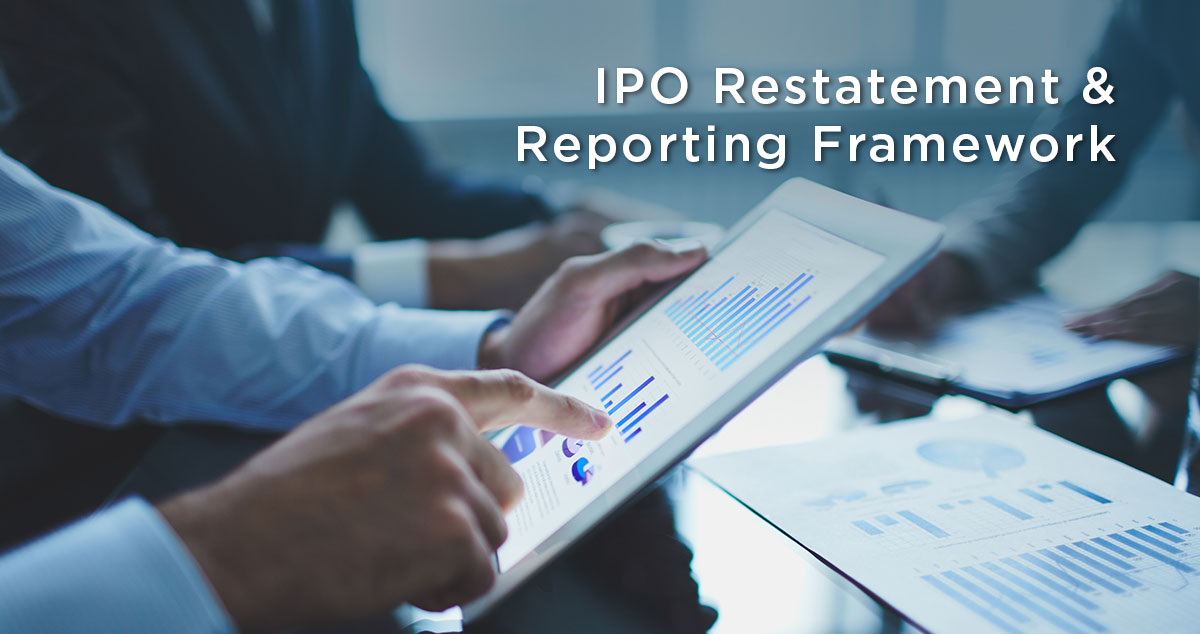Background
Many companies choose an option of Initial Public Offering (IPO) to raise substantial amount of money from capital market. IPO is one of the event in the lifecycle of the company and can fuel the growth of the company. Company coming up with an IPO requires to spend significant amount of time and money to complete an IPO successfully. Financial information in the form of restated financial statements as per SEBI regulations is one of the vital activity in the process of an IPO. Restated financial statements provide company’s historical performance, future prospects including capital structure. Such restated financial statements are to be prepared based on the Schedule III of the Companies Act, 2013 for the period of three years including stub (interim) period. The purpose of this document is to evaluate which reporting framework viz. Indian GAAP or Ind AS, to be used while preparing restated consolidated / standalone financial statements.
Previously, SEBI issued “Issue of Capital and Disclosure Requirements” (ICDR) Regulations during 2016, which required restated financial statements for each of the five financial years immediately preceding the filing of the offer document while following uniform accounting policies for each of the financial years. This information was expected to be presented under Indian GAAP. Meanwhile, Ministry of Corporate Affairs (MCA) notified the Companies (Indian Accounting Standards) Rules, 2015 on 16 February 2015 providing roadmap on implementation of Indian Accounting Standards (Ind AS), which stipulates implementation of Ind AS in a phased manner beginning from accounting period 2016-17 (MCA Ind AS Roadmap).
To align the disclosure requirements for the restated financial statements in the offer document with MCA Ind AS roadmap, SEBI issued a circular during 2016 to clarify which reporting framework to be used for the restated consolidated financial statements to be included in the offer document. Subsequently, SEBI revised ICDR and issued SEBI (ICDR), 2018 requiring the financial information to be presented for previous three years instead of five years. The restatement process is one of the most critical milestones for the company in an IPO journey.
SEBI Regulation for preparation of restated consolidated financial statements
As per SEBI (ICDR) Regulations, 2018, an issuer is required to prepare the restated consolidated financial statements as part of the financial information section of the offer document viz. Draft Red Herring Prospectus (DRHP), Red Herring Prospectus (RHP) and Prospectus. The issuer will have to prepare the restated consolidated financial statements for each of the three financial years immediately preceding the filing of the offer document and stub period, if applicable. Where the company has been in existence for a period less than three years, the financial statements are to be given for the actual period of existence.
The restated consolidated financial information in the offer document shall not be more than six months old from the date of filing of offer document. If the financial statements for latest full financial year included in the offer document are older than six months from the date of filing of the draft offer document, then issuer company will be required to present a restated consolidated financial information for the stub period. For example, a Company with a March year-end going for an IPO, if the company is filing offer document after 30 September, the company will be required to present financial information for the stub period i.e., period ending 30 September.
In accordance with revised SEBI ICDR, 2018, the Institute of Chartered Accountants of India (ICAI), has revised its earlier Guidance Note (GN) on Reports in Company Prospectus.

Applicability of Ind AS in restated consolidated financial statements:
Reporting framework to be followed for restated financial information in an offer document depends on the reporting framework used by the Company in their latest financial year before filing an offer document. We can consider the following scenarios to understand the same:
Ind AS compliant companies
Phase I Companiesof MCA Ind AS roadmap–
Companies falling under Phase I (Transition date 1 April 2015), i.e., companies that have prepared Ind AS financial statements for accounting periods beginning on or after 1 April 2016 shall be required to present all the three years and the stub period (if applicable) in accordance with Ind AS for filing of offer documents on or after 10 November 2018 (date when SEBI issued revised ICDR).
Phase II Companiesof MCA Ind AS roadmap–
Scenario 1 (Transition date 1 April 2016 with first Ind AS financials for FY 2017-18) –
In case a company plans to file an offer document after 31 March 2019 (for e.g. in FY 2019-20), restated information should be prepared in accordance with Ind AS, being the accounting framework followed for the latest financial year i.e. year ended 31 March 2019.
| Period of filing of offer document | Latest financial year | Second latest financial year | Third financial year |
| Up to 31 March 2019 | Ind AS
(FY 2017-18) |
Ind AS
FY 2016-17 |
Proforma Ind AS
FY 2015-16 |
| Between 1 April 2019 to 31 March 2020 | Ind AS
(FY 2018-19) |
Ind AS
(FY 2017-18) |
Ind AS
(FY 2016-17) |
Scenario 2 – (Transition date is after 1 April 2016, for e.g. 1 April 2018 with first Ind AS financials for the FY 2019-20)
In case a company plans to file an offer document before 31 March 2020 i.e. between 1 April 2019 and 31 March 2020 (for e.g. in FY 2019-20), restated information should be prepared in accordance with Indian GAAP, being the accounting framework followed for the latest financial year i.e. year ended 31 March 2020.
| Period of filing of offer document | Latest financial year | Second latest financial year | Third financial year |
| Between 1 April 2019 to 31 March 2020 | Indian GAAP
(FY 2018-19) |
Indian GAAP
(FY 2017-18) |
Indian GAAP
(FY 2016-17) |
Scenario 3 – (Transition date is after 1 April 2016, for e.g. 1 April 2018 with first Ind AS financials for the FY 2019-20)
In case a company plans to file an offer document after 31 March 2020 i.e. between 1 April 2020 and 31 March 2021 (for e.g. in FY 2020-21), restated information should be prepared in accordance with Ind AS, being the accounting framework followed for the latest financial year i.e. year ended 31 March 2020.
| Period of filing of offer document | Latest financial year | Second latest financial year | Third financial year |
| Between 1 April 2020 to 31 March 2021 | Ind AS
(FY 2019-20) |
Ind AS
(FY 2018-19) |
Proforma Ind AS
(FY 2017-18) |
Non-Ind AS compliant Companies:
Companies for which Ind AS accounting framework is not applicable till latest reported financial year and is in the process of listing in the subsequent year, then which reporting framework will be applicable for restated financial information?
As latest financial statements are filed under Indian GAAP, restated financial information shall also be filed under Indian GAAP. Once issuer company is listed, it is required to follow Ind AS for all its subsequent interim reporting or annual reporting periods.
Key reporting considerations
- SEBI has permitted all the companies to voluntarily prepare restated consolidated financial statements for all three financial years preceding the filing in accordance with Ind AS. Generally, companies considering an IPO adopt Ind AS voluntarily and prepare restated financials to ease out financial reporting challenges post listing.
- The SEBI Circular states that the disclosures of an interim period financial information i.e. stub period (if any), in the offer document shall be made in line with the accounting policies followed for the latest financial year.
For example: An issuer company is covered under Phase II of Ind AS roadmap with a transition date 1 April 2016. The company is planning to file offer document on 31 January 2020 and intends to present financial information for interim period (six month period ended 30 September 2019) and for historical three financial years. The accounting framework applicable for the preparation of financial statements for the interim period and historical three financial years shall be as follows:
| Period of filing of offer document | Interim period | Latest financial year | Second latest financial year | Third financial year |
| Between 1 April 2019 to 31 March 2020 | Ind AS (6 months ending 30 Sept 2019) | Ind AS
(FY 2018-19) |
Ind AS
(FY 2017-18) |
Ind AS
(FY 2016-17) |
- Proforma Ind AS financial information is required in case of the Companies where issuer company is non-Ind AS compliant company and voluntarily opts to present restated financial statements for all three years under Ind AS. In this case third years financial information may be falling earlier to the date of transition. SEBI has clarified that they do not intend to push back the transition date. For e.g. company is filing the offer document during the financial year 2021-22, they are required to present restated financial statements for the F.Y. 2020-21 and its comparatives for the F.Y. 2019-20 and 2018-19. However, when entity is adopting Ind AS for the first time for the F.Y. 2020-21, their transition date is 1 April 2019. Here they will restate one more year under Ind AS which is 1 April 2018 to 31 March 2019. Therefore, these companies are required to follow the same accounting policy choices (both mandatory exceptions and optional exemptions availed as per Ind AS 101) as initially adopted on transition date (i.e. 1 April 2019) while preparing financial statements for the FY 2018-19 and accordingly suitable restatement adjustments in the accounting heads need to be made. The financial statements for the FY 2018-19 should be prepared on proforma basis (i.e. “Proforma Ind AS financial statements”) for the purpose of inclusion in the offer document.
| Period of filing of offer document | Interim period | Latest financial year | Second latest financial year | Third financial year |
| Between 1 April 2021 to 31 March 2022 | Ind AS (6 months ending 30 Sept 2020) | Ind AS
(FY 2020-21) |
Ind AS
(FY 2019-20) |
Proforma Ind AS
(FY 2018-19) |
Summary
Issuer company shall prepare restated consolidated financial information to be presented in the offer document based on reporting framework in which they have prepared their latest financial statement before filing offer document. Even if the latest financial statements are in Indian GAAP, SEBI has provided an option to issuer company to adopt Ind AS to restate the financial statements for all three years. For interim period before filing i.e., for stub period, same accounting policies shall be followed which are followed for the latest financial year for restatement. Once offer document is filed, all subsequent interim / annual financial reporting shall be under Ind AS.
At FinPro consulting, our experienced team of consultants can assist in accomplishing the goal-oriented plans of an IPO and can offer assistance with respect to most vital part of IPO journey, the restatement of financial statements under Indian GAAP or Ind AS, as applicable. We are also known for providing DipIFR online training course in Pune, and IFRS / Ind AS Coaching / Training in India. A firm which provides quality IFRS training center located in Pune.








